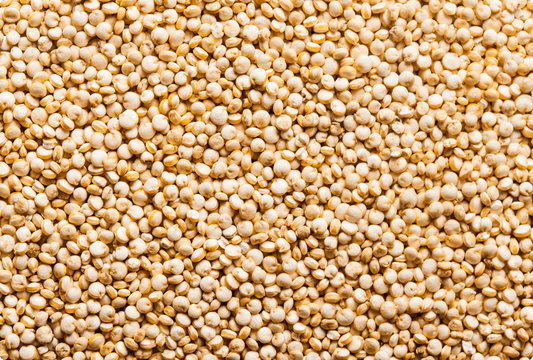The menopausal transition, encompassing perimenopause, menopause, and postmenopause, is a significant and natural biological phase in a woman’s life, marking the end of her reproductive years. This period, characterized by hormonal changes, affects bone health, the cardiovascular system, overall metabolism, and mental well-being. Properly targeted nutrition and supplementation during this time are essential tools that can alleviate unpleasant symptoms and reduce health risks associated with postmenopausal life.
What will you learn in this article?
- What is perimenopause and menopause?
- How estrogen decline affects overall health
- Most common nutrient deficiencies in menopausal women
- Basic supplementation strategies during perimenopause and postmenopause
- Conclusion
- Key takeaways
What is perimenopause and menopause?
The menopausal transition is a gradual process typically divided into three phases: perimenopause, menopause, and postmenopause.
Perimenopause, meaning "around menopause," is the transitional period leading up to menopause. It typically begins in a woman’s 40s and can last from two to ten years, with an average duration of around four years. Perimenopause is marked by the gradual decline in ovarian function, resulting in lower hormone production, especially estrogen. However, this decline is not linear — hormone levels, particularly estrogen and progesterone, fluctuate unpredictably, often described as a "roller coaster." These hormonal shifts are responsible for early symptoms such as irregular menstrual cycles — cycles may become shorter or longer, bleeding heavier or lighter, and some periods may be skipped entirely.
Menopause is defined as a specific point in time — 12 consecutive months after a woman’s last menstrual period. At this stage, the ovaries have ceased releasing eggs, and estrogen production has dropped to very low levels. The average age of menopause in Europe is between 45 and 55 years.
Postmenopause is the period following menopause and continues for the rest of a woman’s life. Estrogen levels remain permanently low, and although many perimenopausal symptoms such as hot flashes may gradually subside, the health risks associated with low estrogen — particularly for bone and heart health — persist.

Throughout this transition, women may experience a wide range of physical and emotional symptoms. The most common include:
-
Hot flashes (a sudden sensation of heat in the face, neck, and chest) and night sweats.
-
Sleep disturbances: Often caused by night sweats, but may also include standalone insomnia.
-
Mood changes: Increased irritability, anxiety, tension, and a higher risk of depression.
-
Urogenital symptoms: Vaginal dryness causing discomfort during intercourse, and increased susceptibility to urinary and vaginal infections due to thinning tissues.
-
Physical changes: Joint and muscle pain, dry skin, thinning hair, and changes in body composition, such as weight gain.
-
Cognitive changes: Difficulty concentrating and temporary memory lapses, often referred to as "brain fog."
How estrogen decline affects overall health
The decline in estrogen is not just the source of unpleasant symptoms — it systematically affects key systems in the body and significantly alters a woman’s nutritional needs.
Bone health and osteoporosis risk: Estrogen plays a critical role in maintaining bone metabolism balance. It inhibits osteoclasts — cells responsible for bone resorption. With declining estrogen, osteoclast activity increases, tipping the balance toward bone breakdown. This leads to a rapid loss of bone mineral density, increasing the risk of osteopenia and eventually osteoporosis.
Cardiovascular system: Before menopause, women have significantly lower risk of cardiovascular disease compared to men, largely due to estrogen’s protective effects. Estrogen helps maintain a favorable lipid profile, supports vascular elasticity, and has anti-inflammatory properties. As estrogen declines, this protection diminishes. LDL cholesterol levels rise, HDL cholesterol levels fall, and blood pressure often increases, along with inflammation in the blood vessels — all contributing to a rapid increase in cardiovascular risk in postmenopausal women, often surpassing that of men of the same age.
Metabolism and body composition: Hormonal changes directly impact metabolism and fat distribution. Metabolic rate slows down, making weight gain easier. The drop in estrogen promotes fat accumulation in the abdominal area (visceral fat), which is more metabolically active and strongly linked to a higher risk of heart disease and type 2 diabetes. Simultaneously, muscle loss accelerates — a condition known as sarcopenia. Muscle loss not only further slows metabolism but also reduces physical strength and mobility, increasing the risk of falls and fractures.
Mood and cognitive function: Estrogen influences brain function and regulates neurotransmitters such as serotonin, which plays a key role in mood and well-being. Hormonal fluctuations and the eventual decline in estrogen can disrupt this delicate balance, contributing to frequent mood swings, irritability, anxiety, and an increased risk of depression. Temporary memory and concentration problems are also common and are linked to fluctuating estrogen levels in the brain.
Most common nutrient deficiencies in menopausal women
Women in perimenopause and menopause face an increased risk of deficiency in several key nutrients. These nutrient deficiencies often interact and intensify the negative effects of hormonal changes.
Vitamin D: the “sunshine” vitamin for healthy bones and immunity
Vitamin D is absolutely essential for women in menopause. One of its many roles is regulating calcium and phosphorus metabolism, which is vital for the absorption of calcium from the intestines and its incorporation into bones. Additionally, vitamin D plays a key role in immune function, mood regulation, and maintaining muscle strength — helping to prevent falls and fractures.
Vitamin D deficiency is a serious issue among postmenopausal women. A large European study from 2007 [1], conducted on over 8,500 postmenopausal women, showed that nearly 80% had inadequate levels of vitamin D (below 80 nmol/L). In the subgroup of women under 65, the prevalence was even higher — 86%.
The primary source of vitamin D is synthesis in the skin when exposed to UVB rays from sunlight. However, in European latitudes, this synthesis is insufficient from October to March. Dietary sources are also relatively limited, with the best including fatty sea fish (such as salmon, mackerel, sardines, herring), and to a lesser extent, egg yolks.
Calcium: the cornerstone of healthy bones
Calcium is the most abundant mineral in the human body, with approximately 99% found in bones and teeth, providing structure and strength. During menopause, when accelerated bone loss threatens skeletal integrity, adequate calcium intake becomes critical to slowing this process and preventing osteoporosis. Calcium is also essential for proper nervous system function, muscle contraction, and blood clotting.
Despite its importance, calcium intake among European postmenopausal women is often insufficient. The World Health Organization (WHO) recommends a daily intake of 1300 mg for this group. The same European study on osteoporotic women revealed that the average intake was only around 930 mg. It also found that nearly 42% of women consumed less than 800 mg of calcium per day — the recommendation for premenopausal adult women. In all studied countries, average calcium intake remained below the recommended level.
Magnesium: a mineral for balance of body and mind
Magnesium is a cofactor for over 300 enzymatic reactions in the body and plays a crucial role during menopause. It is essential for bone health, as it supports bone tissue mineralization and is also critical for the metabolism and activation of vitamin D. Without sufficient magnesium, the body cannot effectively use vitamin D. Magnesium also helps regulate blood pressure, supports insulin sensitivity (important for preventing metabolic syndrome), contributes to normal muscle and nerve function, and plays a significant role in mood regulation and quality sleep — helping to ease anxiety and insomnia often associated with menopause.
Inadequate magnesium intake is relatively common. Estimates for Europe suggest that 10% to 30% of the population consumes too little magnesium. The European Food Safety Authority (EFSA) has set the adequate intake for adult women at 300 mg per day. Many women do not meet this recommendation, partly due to diets high in processed foods, which are typically low in magnesium.
B vitamins (B12, B6, folate): energy, emotional well-being, and heart health
B vitamins are essential for a wide range of bodily functions that may be disrupted during menopause due to hormonal changes. They are key for energy production and play a vital role in the nervous system and the synthesis of neurotransmitters such as serotonin and dopamine. These directly influence mood and can help ease feelings of anxiety and depression. From a long-term health perspective, an important function of B vitamins is the regulation of homocysteine levels. Vitamins B6, B12, and folate (B9) are necessary to break down this amino acid. Elevated homocysteine is an independent risk factor for cardiovascular diseases, such as heart attacks and strokes. Since the risk of these conditions increases after menopause, maintaining balanced homocysteine levels is essential.
The risk of B vitamin deficiencies, especially B12, increases with age. B12 absorption from food depends on the presence of intrinsic factor, which is produced in the stomach. In older age, atrophic gastritis becomes more common, limiting the production of this factor and leading to reduced B12 absorption. It is estimated that 1.6–10% of the European population is deficient in vitamin B12, with the highest risk seen in women over 60. [2]
Omega-3 fatty acids (EPA and DHA): inflammation regulation and support for the brain and heart
Omega-3 fatty acids — specifically eicosapentaenoic acid (EPA) and docosahexaenoic acid (DHA) — are polyunsaturated fats with anti-inflammatory properties. Their importance during menopause is significant. The drop in estrogen leads to increased systemic inflammation, which underlies many chronic diseases. Omega-3s act as a natural counterbalance to this process. They are crucial for cardiovascular health, help lower blood triglycerides, reduce blood pressure, and support a healthy heart rhythm. Omega-3s are also essential for brain function and may help alleviate psychological symptoms of menopause, such as depressive moods and anxiety.
Although data on omega-3 deficiency in menopausal women are not as well documented as for vitamin D, it is well known that the typical Western diet is low in EPA and DHA and high in pro-inflammatory omega-6 fatty acids.
Protein: for maintaining muscle mass and strength
Protein is a key macronutrient during menopause. Increased protein intake is critical for preventing sarcopenia — the accelerated loss of muscle mass and strength that occurs with aging and hormonal changes. Maintaining muscle mass is vital for preserving physical strength, balance, and mobility. Strong muscles also support the skeletal system and reduce the risk of falls. Additionally, protein contributes to a longer feeling of fullness, which helps regulate body weight at a time when the body tends to store more fat.
Unfortunately, many women — especially older ones — do not consume enough protein. Experts recommend that older adults, including menopausal women, consume 1.0 to 1.2 grams of protein per kilogram of body weight per day.
Foundational supplementation strategies during perimenopause and postmenopause
As the name suggests, supplementation is meant to complement — not replace — a healthy, high-quality, and balanced diet. The foundation of health, including during menopause, is a diet rich in whole, unprocessed foods. A Mediterranean-style diet, high in vegetables, fruits, whole grains, legumes, healthy fats (from olive oil, nuts, and fish), and protein, can help reduce menopausal symptoms and support cardiovascular health.
Below is a group of supplements that form the cornerstone of nutritional support for most women in perimenopause and menopause. These supplements target the most common and clinically significant deficiencies that greatly impact long-term health.
Vitamin D3
For effective vitamin D supplementation, it is advisable to first determine the serum concentration of 25-hydroxyvitamin D, which allows for accurate individual dosage. While optimal blood levels of vitamin D are still debated, a range between 100 and 150 nmol/L is generally considered beneficial for health. [3]
You can assess your vitamin D status using a home blood spot test — Vitamin D Level. Results are available within a few days via an online platform and include expert interpretation and personalized recommendations.
Vitamin K2
Vitamin K2 is a key cofactor in calcium metabolism and complements the effects of vitamin D by regulating calcium transport and deposition. It activates proteins responsible for mineralizing bone matrix while inhibiting calcification of soft tissues. Adequate intake of vitamin K2 is therefore essential for maintaining healthy arteries, bone density, and preventing osteoporosis. For postmenopausal women, a daily supplement of 120 mcg of vitamin K2 is recommended.
Magnesium
Magnesium is an essential mineral required for proper functioning of many enzymatic processes, yet it is commonly deficient in the general population. Supplementation with 200–400 mg of elemental magnesium daily can effectively meet the body’s increased needs. The preferred form is magnesium bisglycinate, a chelated version with high bioavailability and gentle on the digestive tract. Due to its binding with the amino acid glycine, magnesium bisglycinate also has calming effects — making it ideal for evening use to support sleep and reduce anxiety.
Omega-3
To ensure sufficient anti-inflammatory effects and support for the heart and brain, a daily intake of approximately 1000 mg of combined EPA and DHA is recommended. As with vitamin D, it is beneficial to personalize omega-3 dosage based on your Omega-3 Index — a biomarker that reflects the percentage of EPA and DHA in red blood cell membranes. This provides a reliable overview of long-term omega-3 status and allows for targeted supplementation. Optimal Omega-3 Index levels for cardiovascular, cognitive, and inflammatory health are considered to be between 8–12%.
To help you choose the right omega-3 supplement, we recommend this simple quiz that guides you toward the optimal product based on your individual needs.
Calcium
Calcium supplementation requires a careful, personalized approach. The goal is to achieve a total daily intake (from both food and supplements) of 1200 mg. The first step should be evaluating dietary calcium intake. Supplements should then only be used to fill dietary gaps.
You can learn more about calcium supplementation in our 43rd podcast episode with Jakub Přibyl, nutrition expert and product developer at Trime.
Trime Calcium + D3/K2 is a natural supplement made with organic powder from marine calcium-rich algae *Lithothamnion superpositum*. These algae are a naturally rich source of highly absorbable calcium. In addition to calcium, they contain other key minerals such as magnesium that contribute to bone health and are well tolerated due to their natural form.
Other supplements may be beneficial for specific groups of women, depending on dietary habits, age, or individual health goals. These include B-complex, collagen peptides, or protein powders.
B-complex or Vitamin B12
Supplementation is strongly recommended for vegans and vegetarians, who typically lack natural sources of vitamin B12 in their diet. It may also be suitable for women over 60, whose absorption ability declines, and for those taking medications that reduce stomach acid (e.g., proton pump inhibitors), which interfere with B12 absorption. A quality B-complex provides balanced support of all B vitamins, which are critical during menopause for energy metabolism, nervous system function, and emotional resilience. When supplementing B vitamins, it’s important to choose active (methylated) forms to ensure bioavailability — especially for women with genetic polymorphisms (e.g., in the MTHFR gene) that affect B vitamin metabolism.

Collagen Peptides
Collagen is the most abundant protein in the human body — found in bones, joints, cartilage, and skin. Supplementing collagen can be a valuable strategy to support the musculoskeletal system and skin health. A 2018 study [4] involving 131 postmenopausal women found that daily intake of 5 grams of collagen peptides for one year significantly improved bone mineral density compared to placebo.
Protein Powders
Many women may find it challenging to meet the recommended daily protein intake (1.0–1.2 g/kg of body weight) through food alone — due to low appetite, time constraints, or dietary preferences. In such cases, high-quality protein supplements can be a practical and effective solution. They are easy to incorporate into meals — for example, added to smoothies, yogurt, or oatmeal — and help ensure sufficient protein intake for maintaining muscle mass.
Herbal Support During Menopause
Herbal remedies are often used during menopause to help relieve symptoms such as hot flashes, mood swings, and sleep disturbances. Commonly used botanicals include phytoestrogens (e.g., from soy or red clover), which are plant compounds structurally similar to human estrogen. Because of this similarity, they can bind to estrogen receptors in the body. Depending on current estrogen levels, they may exert mild estrogenic effects (when levels are low, such as during menopause) or anti-estrogenic effects (when levels are high, by blocking stronger estrogen).
There are many other plant-based preparations with potential benefits, though their efficacy varies and is not always well-supported by scientific evidence. Therefore, the choice of specific herbs and supplements should be individualized and guided by an experienced professional — such as a naturopath, herbalist, or qualified nutrition therapist. A personalized approach is key to safe and meaningful herbal therapy in menopause.

Conclusion
The transition into menopause should not be viewed with fear, but rather as an opportunity to take active control of your health. Adjusting your diet and supplementing critical nutrients can help ease uncomfortable symptoms — and more importantly — support long-term health, vitality, and quality of life in this new life stage.
Key Takeaways
-
Menopause is a natural life stage associated with a decline in estrogen, affecting bone health, heart health, metabolism, and mental well-being.
-
Hormonal changes can bring a variety of physical and emotional symptoms, including hot flashes, sleep disturbances, mood swings, "brain fog", weight gain, and muscle loss. Risks of osteoporosis, cardiovascular disease, anxiety, and depression also increase.
-
A targeted diet and supplements can help ease symptoms and reduce health risks.
-
Nutrition should prioritize healthy habits based on whole, unprocessed foods.
-
Key supplements commonly lacking in menopausal women include:
- Vitamin D + K2 – crucial for bone and vascular health
- Calcium – essential for slowing bone loss
- Magnesium – supports bones, sleep, nerves, mood, and vitamin D metabolism
- B vitamins (B6, B12, folate) – influence mood, memory, energy production, and heart health
- Omega-3 fatty acids (EPA, DHA) – anti-inflammatory, support brain and heart function
- Protein – adequate intake is critical to maintain muscle mass and strength
References:
[1] Bruyère O, Malaise O, Neuprez A, Collette J, Reginster JY. Prevalence of vitamin D inadequacy in European postmenopausal women. Curr Med Res Opin. 2007 Aug;23(8):1939-44. doi: 10.1185/030079907X219562. PMID: 17631697.
[2] Azzini, E.; Raguzzini, A.; Polito, A. A Brief Review on Vitamin B12 Deficiency Looking at Some Case Study Reports in Adults. Int. J. Mol. Sci. 2021, 22, 9694. https://doi.org/10.3390/ijms22189694
[3] Charoenngam N, Holick MF. Immunologic Effects of Vitamin D on Human Health and Disease. Nutrients. 2020 Jul 15;12(7):2097. doi: 10.3390/nu12072097. PMID: 32679784; PMCID: PMC7400911.
[4] König D, Oesser S, Scharla S, Zdzieblik D, Gollhofer A. Specific Collagen Peptides Improve Bone Mineral Density and Bone Markers in Postmenopausal Women — A Randomized Controlled Study. Nutrients. 2018 Jan 16;10(1):97. doi: 10.3390/nu10010097. PMID: 29337906; PMCID: PMC5793325.





















